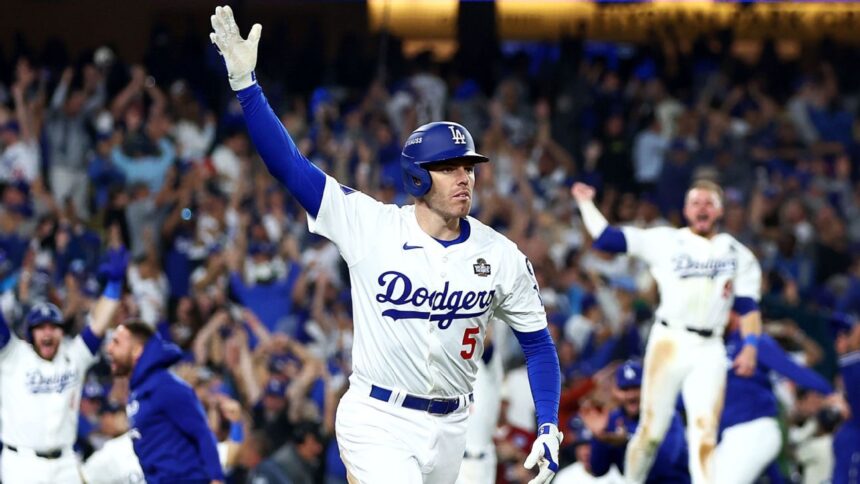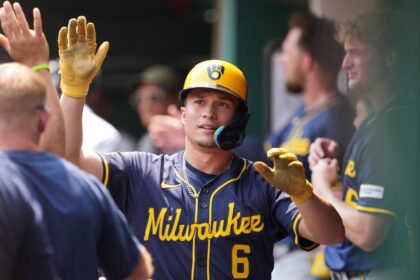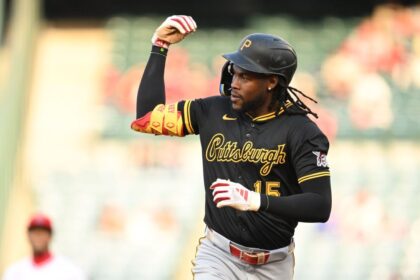The Unforgettable Legacy of Freddie Freeman: A Home Run That Defined a City
The image of Freddie Freeman, victorious after the home run that defined the World Series on October 25, 2024, has become an omnipresent symbol in Los Angeles County. Freeman himself has signed four tattoos that immortalize that moment, three on shins and one on an arm. Before, he could walk around Southern California without being recognized; now, fans constantly approach him, reminiscing about the precise instant he hit the home run that propelled the Los Angeles Dodgers to the championship.
“I’m happy about that. It means something good happened, right? You don’t try to make that moment happen; it just comes to you, and you hope you’re ready for it. There are so many times I failed, and nobody really remembers the failures.”
Freddie Freeman
Freeman’s home run, the first of four in a World Series where he recorded an OPS of 1.364 and won the Most Valuable Player award, has been replicated on countless bobbleheads, t-shirts, and paintings. It is projected on the giant screen at Dodger Stadium before every home game and could remain there forever, evoking Kirk Gibson’s feat 36 years ago.
At 35, Freeman is batting better than ever, despite dealing with the same ankle injury that affected him in October. His performance in his thirties has surpassed that of his twenties, and reaching 3,000 hits, a feat almost unimaginable in this era dominated by pitchers, remains a real possibility. The Hall of Fame is almost a certainty. However, a single swing on one night will somehow overshadow any other achievement of Freeman’s, a reality that is emphasized with the Yankees’ return to Dodger Stadium this weekend.Freeman, known for his strict routine, is also sentimental. While some of his colleagues spoke about the importance of moving forward to avoid disappointments, Freeman questions why he cannot enjoy success while preparing for the next challenge. He wishes to savor that moment, recognizing its uniqueness after a long career.“And that’s okay. Something great happened for us to win the World Series, and I loved every second.”
Freddie Freeman
An interaction with a fan, lasting only three minutes, reaffirmed it. During a luncheon for those affected by the Los Angeles fires, a man recounted how he stopped drinking the night of Freeman’s home run. The fan, from the right field section, promised to be sober for his two children. Freeman’s ball flew over their heads, and his children only wanted to play baseball the next day, something that, according to the man, would not have been possible due to the hangover. This time, he had the energy to play all day, and he hasn’t touched alcohol since then.
“Chills. And you think about how sports can impact people’s lives in such a positive way, that being a part of something like this is something very special. I love this game. It helped me get through difficult times when I lost my mother; my father and I used to play baseball. It helps. And when you close the circle 25 years later, at 35 years old, and create a moment for someone, that’s what it’s all about for me. I love winning and championships, but knowing that I could impact someone’s life in such a positive way, I still don’t know if I can take it in.”
Freddie Freeman
When Freeman crossed home plate, he ran to his father, Fred, to high-five through the net behind the plate. His mother passed away from melanoma when he was 10 years old. Baseball became his therapy. The fan’s story reminded him of the impact that moment could have on the lives of those two children.
“Sports are great, man. They can do so many good things for so many people.”
Freddie Freeman
Freeman battled through the first three weeks of last postseason due to the right ankle injury suffered on September 26 and the rib injury from the following week. The Game 5 loss against the New York Mets was, in a way, a blessing. The change in the MLB schedule gave Freeman six full days of rest before the World Series. He was fully recovered, able to hit a triple in the first inning and to hit Nestor Cortes’ 10th-inning pitch, sending the ball 413 feet to create one of the most iconic moments in postseason history. The Dodgers won the series in five games.
“So many little things, and it could have gone so many different ways.”
Freddie Freeman
After the World Series, Freeman thought rest would heal his ankle. Four weeks later, he could barely walk. Tests revealed he had four torn ligaments, requiring surgery. After four months of rehabilitation, a fall in the shower on March 30th re-aggravated the injury, forcing a brief stint on the injured list.
In his first 11 games after his return, Freeman batted .250. However, a single to the opposite field against Paul Skenes on April 25th sparked a feeling he had been searching for. Since then, he’s batting .412/.474/.647 in 31 games. His .368 batting average and 1.065 OPS this season trail only Aaron Judge. His 186 weighted runs created plus (wRC+) are tied for his career-best, set in the COVID-19 shortened season, when he was named NL MVP.
The Dodgers, who many expected to break the regular season wins record, currently have 14 pitchers on the injured list and are struggling to maintain a slight lead over the San Diego Padres and the San Francisco Giants in the National League West, with a record of 35-22. Despite this, Dodgers manager Dave Roberts believes that Freeman has reached a new level of intensity.
“He is focused. It’s not the relaxed intensity he usually has; it’s a more energetic intensity.”
Dave Roberts
Freeman’s daily treatment for his right ankle has been reduced from four hours to just 40 minutes. He feels significantly better, but the trainers have told him he won’t be fully recovered until after the All-Star Game. He still uses insoles in his shoes to alleviate discomfort. His first steps in the morning are still painful. The Dodgers don’t allow him to steal bases, a restriction that frustrates him. However, his production continues.
Freeman is on pace to record 7.1 wins above replacement (WAR) according to FanGraphs this season, which would represent the second-highest total of his career. If he achieves this, he will rank seventh among first basemen in compiled WAR between the ages of 31 and 35, trailing only Roger Connor, Willie Stargell, Bill Terry, Mark McGwire, Stan Musial, and Lou Gehrig. If he accumulates 75 more hits, something almost certain if he avoids prolonged injuries, he will have compiled over 2,400 by the end of the season, giving him a good chance to reach 3,000 in the second half of his 30s.In his 20s, Freeman batted .293/.379/.504. In his 30s, he has improved to .317/.405/.533. Nowadays, Freeman has an added incentive to remain productive:
He wants his home run tattoos to last.“I need to keep playing well so that, hopefully, they still appreciate those tattoos in 30 years”.
Freddie Freeman











